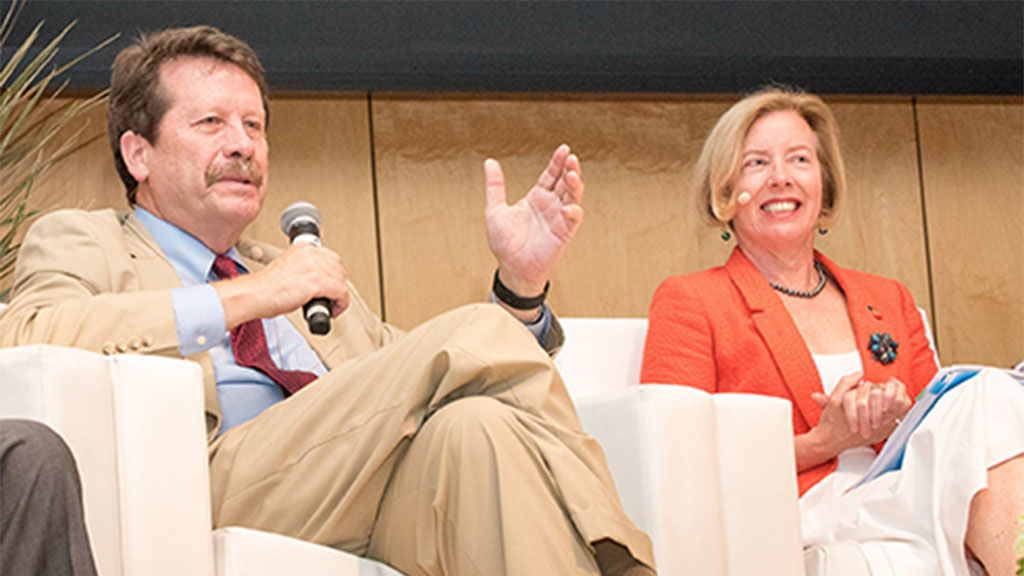News Updates
- Benefits of Integrating Patient Engagement with Diversity, Equity, and Inclusion in New Medical Product Development: A Call for Action
- Drug Shortages in the Global South: A Proposed Parallel Tech and Reg Transfer Framework
- Fair Pay for Patient Engagement: Navigating the Evolving Landscape of Remuneration
- Industry’s Window to Express Interest in Africa Continental Product Evaluation Pilot Closes End of February 2024
- Accelerating Adoption of eLabeling in Singapore: One Company’s Journey
Regulators Discuss BREXIT & Cancer Moonshot
One of the first DIA 2016 Annual Meeting DIAmond sessions, International Regulatory Convergence, Collaboration, and Cooperation, convened a senior panel of global regulators to share with attendees the challenges in their respective jurisdictions, domestically and internationally, and discuss mutual reliance activities, including and especially the emerging International Coalition of Medicines Regulatory Authorities (ICMRA).

Part 1: FDA, PMDA, EMA
Executive leadership from the regulatory bodies of Europe (Emer Cooke, Head of International Affairs, EMA), Japan (Dr. Tatsuya Kondo, Chief Executive, PMDA), and the US (Dr. Robert Califf, Commissioner, FDA) introduced their organizations and the primary challenges they currently face.Dr. Califf cited several of his priorities for innovation as FDA Commissioner. He is grateful for support from the Executive Branch for innovative cancer research embodied in the Cancer Moonshot, and alerted attendees that a major announcement on this initiative was forthcoming the next day (June 29). Other priorities for innovation include the dramatic shift in the source of most APIs and devices, particularly India and China; increasing the scientific understanding of his workforce on such advances as 3- and 4-D printing; and integrating the knowledge base and support systems across all review centers.
“It’s quite noticeable that our evidence-generating system is not keeping up with this technology,” he said. Instead, he envisions a “life-long evidence-based learning system.” “There are a number of issues in the US that I wouldn’t wish on anyone else,” Dr. Califf said in reference to the current opioid addiction/abuse epidemic.
Dr. Kondo outlined and explained four key points of PMDA’s progress as an organization. Time-limited, conditional approval more evenly balances pre-/postmarket evidence requirements to get products to patients faster, and MHLW has already approved two products under this new system. The new Sakigake system gives priority handling to innovative medical products for serious diseases that also meet other criteria. “By using this system, innovative products will be launched earlier,” he explained.
“Collaboration from research to approval is essential,” he continued, noting PMDA’s working relationships with AMED (the Japan Agency for Medical Research and Development), National Cancer Center, and numerous universities. PMDA must also continue to provide assurance to the public against adverse drug reactions, infections, and other risks. “I strongly believe that the promotion of regulatory science is one of the most important bases of innovation,” he concluded. “That is my reality-based future vision.”
Emer Cooke explained that she was standing in for EMA Director Dr. Guido Rasi, who remained in London to support the people at EMA who are greatly impacted, professionally and personally, by the recent BREXIT vote. “It’s a period of uncertainty for us,” she allowed. EMA innovations include the recent PRIME (PRIority MEdicines) scheme, which gives added support to applicants from academia and small- or medium-sized organizations who often have limited regulatory experience.
The growing field of innovative advanced therapies (such as genetic medicine and tissue engineering) also present unique regulatory challenges to keep pace. “Our immediate challenge is to keep going in the face of unexpected events, which I’m quite confident we will do,” she concluded.
Part 2: ICMRA
The second part of this session reviewed the membership and structure of the International Coalition of Medicines Regulatory Authorities (ICMRA) and its three strategic priorities: Supply chain integrity, crisis management and pharmacovigilance.ICMRA Chair Anil Arora (Health Products & Food Branch, Health Canada) described its vision as a strategic, multi-lateral collaboration among its 22 members, anchored in the belief that the heads of these 22 regulatory agencies need a framework for collaboration. ICMRA seeks to complement, not duplicate, efforts by ICH, WHO and similar organizations, and has recently released communications on the Ebola and Zika crises. “We are still learning and developing and this will continue to take some time,” he allowed.
ICMRA Vice-Chair Dr. Lorraine Nolan (Health Products Regulatory Authority, Ireland) presented the organization’s structure, “a coalition of the willing” on a voluntary basis. “It really is a truly global organization in terms of its membership,” she explained. (Dr. Kondo also serves as ICMRA Vice-Chair, further reflecting the connections among all these agencies.)
After these overviews, panelists detailed projects undertaken around the three strategic priorities. Jonathan Mogford (Medicines and Healthcare Products Regulatory Agency, UK) detailed the GMP inspection project to combat global supply chain integrity issues. Project Lead Dr. John Skerritt (Department of Health, Australia) described the ICMRA pharmacovigilance project as a vehicle for sharing learning and more structured collaboration between regulators on emerging technologies and policy issues – “a global forum to share what works and what doesn’t work in a ‘safe harbor’.”
Project Lead Dr. Jarbas Barbosa (Agência Nacional De Vigilância Sanitária, Brazil) concluded with the ICMRA crisis management project in the face of SARS, AH1N1 pandemic influenza, Ebola, Zika, and similar outbreaks. The efforts include a standard definition for a health crisis and standard operating procedures prepared in advance of the next outbreak or crisis. “We don’t know what, where or when the next global health crisis will occur – but we know that it will. And with these activities, we will be more prepared to respond to it,” he concluded.
This article originally appeared in the August 2016 Global Forum.
